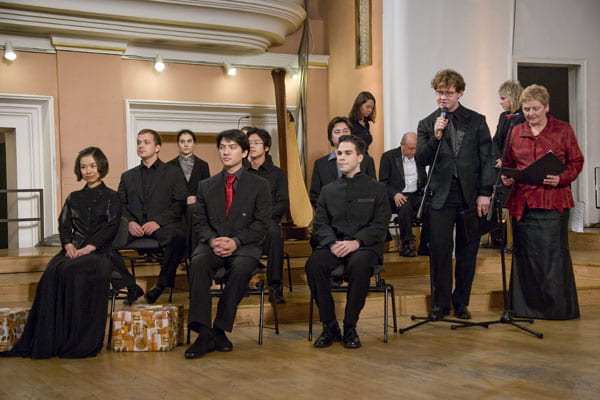Polish Music Center Newsletter Vol. 13, no. 12
Polish Independence Day
A Tribute In Los Angeles
By Krysta Close
On the evening of November 8th at 7:30 pm in downtown Los Angeles, the lights were shining brightly on the stage of Zipper Hall and the audience was abuzz. There was a palpable excitement in the air for the event about to commence: a celebration of Poland’s Independence Day organized by the Consulate General of the Republic of Poland in Los Angeles. The festive evening began with the Polish and American national anthems, performed gracefully by Midnight Winds, a USC-based ensemble. Paulina Kapuścińska, Poland’s new Consul General in Los Angeles, opened the official part by welcoming a large representation of the diplomatic corps, Polish Army veterans, and an overflowing audience composed of the émigré community and their numerous American friends. In her brief remarks, Consul Kapuścińska spoke of the importance of November 11 in the modern history of Poland and bestowed a Gloria Artis medal, given by the Ministry of Culture and National Heritage in Poland, upon Marek Zebrowski, Director of the Polish Music Center at USC and a co-organizer of the evening’s events.
 The main attraction of the evening, however, was the program of Polish film music. The Midnight Winds and USC Strings were joined on stage by a cast of celebrities, including the double bass virtuoso, Darek Oleszkiewicz, the renowned vocalist, Anna Jurksztowicz (pictured at right), and Maestro Krzesimir Dębski, the acclaimed composer, conductor, violinist and pianist. The varied and entertaining presentation began with the wind quintet arrangement of Paderewski’s famous Menuet, and was followed by Chopin’s Nocturne in C-sharp minor performed by cellist Lars Hoefs and pianist Marek Zebrowski. Immediately afterwards, the entire ensemble came on stage for a performance of Urodziny [Birthday Music] by Dębski, sung by Anna Jurksztowicz under the direction of her husband and composer.
The main attraction of the evening, however, was the program of Polish film music. The Midnight Winds and USC Strings were joined on stage by a cast of celebrities, including the double bass virtuoso, Darek Oleszkiewicz, the renowned vocalist, Anna Jurksztowicz (pictured at right), and Maestro Krzesimir Dębski, the acclaimed composer, conductor, violinist and pianist. The varied and entertaining presentation began with the wind quintet arrangement of Paderewski’s famous Menuet, and was followed by Chopin’s Nocturne in C-sharp minor performed by cellist Lars Hoefs and pianist Marek Zebrowski. Immediately afterwards, the entire ensemble came on stage for a performance of Urodziny [Birthday Music] by Dębski, sung by Anna Jurksztowicz under the direction of her husband and composer.
 The musical feast of high-quality entertainment followed as Dębski (pictured at left)—with his mixture of good-natured humor and engaging stage presence—introduced several selections of his own music from feature films and TV serials. Anna Jurksztowicz, a charming and excellent vocalist, gave lively and heartfelt interpretations of Dębski’s hit songs from The Clan, Lonely Hearts, Cantabile—They Came at Dusk, For Good and Ill, finishing with Helena’s Song from Ogniem i mieczem that brought the full house to its feet in a prolonged standing ovation.
The musical feast of high-quality entertainment followed as Dębski (pictured at left)—with his mixture of good-natured humor and engaging stage presence—introduced several selections of his own music from feature films and TV serials. Anna Jurksztowicz, a charming and excellent vocalist, gave lively and heartfelt interpretations of Dębski’s hit songs from The Clan, Lonely Hearts, Cantabile—They Came at Dusk, For Good and Ill, finishing with Helena’s Song from Ogniem i mieczem that brought the full house to its feet in a prolonged standing ovation.
Between Dębski’s award-winning film scores, other Polish film composers were also represented on the gala concert’s program, and each piece presented the audience with a lively collaboration from the exceptional musicians. Krzysztof Komeda’s Lullaby from Rosemary’s Baby was given a beautifully lyrical reading by the ensemble after a virtuoso double bass introduction by Darek Oleszkiewicz. The delicate and haunting melody deftly rendered by percussionist Daniel Kaminski on a glockenspiel was artfully ornamented by Dębski’s violin solo improvisations. One of Henry Vars’ great 1930s hit songs, Na pierwszy znak, was stylishly delivered by the entire ensemble. Members of the Vars family—his son Robert, daughter Danuta and grandson Dennis—were present at the Independence Day concert. Two short piano compositions from film scores by Marek Zebrowski further added to a highly entertaining musical fare. The evening was capped by an appropriately-titled encore, Good Night, touchingly delivered by Anna Jurksztowicz with her husband, Krzesimir Dębski, accompanying her on the piano. A long and hearty applause followed the performers all the way to the post-concert reception, hosted by the Consulate and POLAM Federal Credit Union. All in all, it was a fitting tribute to Poland’s national holiday, and a night to remember for a long time to come.
Stojowski In Białystok
On November 11th, the Podlasie Opera and Philharmonic (pictured above) performed works by Zygmunt Stojowski and Stanisław Moniuszko in celebration of Polish Independence Day. The score of the first piece on the program, Stojowski’s cantata Modlitwa za Polskę, Op. 40, was provided by the Polish Music Center’s recently donated Zygmunt and Luisa Stojowski Collection. Other works performed were Stojowski’s Suite in E flat Major for Symphony Orchestra, Op. 9 (score available for download at: https://urresearch.rochester.edu/handle/1802/1548) and Moniuszko’s concert overture Bajka. The concert featured the chorus and orchestra of the Podlasie Opera and Philharmonic, with artistic director Marcin Nałęcz-Niesiołowski conducting, as well as soloists Marta Wróblewska – soprano, Maciej Bogumił Nerkowski – baritone, and Rafał Sulima – organ.
If you would like to see and hear this beautiful performance, please visit the Performance Archives of the Podlasie Opera and Philharmonic.
PMC Appeal
Dear Friends of Polish Music,

We would like to share some excellent news with you. On 4 October 2007 the Paderewski monument was officially unveiled on the USC campus. This festive occasion brought together the highest levels of the Polish government, the leadership of the University, and the Polish community in North America to celebrate an extraordinary musician, statesman, and patriot. Our fundraising drive, to which over 130 institutions and individuals contributed generously, succeeded in recognizing Paderewski as the first Pole in California to be honored with a monument.
The Polish Music Center at USC is proud to have coordinated this great initiative. We are also very grateful to all Polish-Americans—living near and far—for helping us to raise funds and for attending the unveiling. With this project behind us, our work of promoting Polish music continues. We present concerts, organize music festivals and competitions, publish books, maintain our library and reference center, and assist students and music professionals of all nationalities to program Polish music on concert stages around the world.
Polish Ambassador Janusz Reiter and USC Provost C.L. Max Nikias cutting the ribbon.
Photo by Doug Spice. Property of the Polish Music Center USC.
Last year, we asked you in the survey to indicate your preferred times for events we organize on the USC campus. Your responses favored Wednesday’s Music at Noon series and weekend matinee presentations. As we coordinate our concert calendar with other USC events, we will work to schedule our concerts on dates that your responses indicated were convenient.
Looking at the year ahead, we would like to count on two very important matters:
- Your attendance at our concerts (they are always free of charge)
- Your financial support of our goals
We would like to thank all of our past contributors who have generously shared our vision of promoting Polish music. Individual donations sustain everything we do, so please consider making another donation this year. Since only a small percentage of the community is involved in supporting the Polish Music Center, we appeal to new donors to help in our mission as well. Thank you for considering this year’s appeal. We look forward to your continued support.
Thank you,
Marek Zebrowski, Director &
Krysta Close, Manager
Please make donations out to the Polish Music Center and send them to:
Polish Music Center USC
840 W. 34th St.
Los Angeles, CA 90089-0851
Please contact (213) 821-1356 or krystacl@usc.edu if you have any questions.
News
Chopin’s Manuscript In Poland
 The Frederic Chopin Museum in Warsaw has obtained the manuscript of Chopin’s Fantaisie-Impromptu in C sharp Minor. The piece was originally notated in an album of Baroness d’Estee, a friend and a student of Chopin’s in Paris. The album is especially valuable since Baroness d’Estee collected many manuscripts by Bellini, Cherubini, Rossini and Moscheles, among others, but only Chopin’s manuscript was penned in directly into the notebook. The others were pasted in along with some original watercolor miniatures.
The Frederic Chopin Museum in Warsaw has obtained the manuscript of Chopin’s Fantaisie-Impromptu in C sharp Minor. The piece was originally notated in an album of Baroness d’Estee, a friend and a student of Chopin’s in Paris. The album is especially valuable since Baroness d’Estee collected many manuscripts by Bellini, Cherubini, Rossini and Moscheles, among others, but only Chopin’s manuscript was penned in directly into the notebook. The others were pasted in along with some original watercolor miniatures.
Polish researchers have long tried to acquire this rare manuscript but when it was last auctioned in 2002, it was sold for 300,000 Euro – a price which the Chopin Museum could not afford. It was instead sold to Dr. Matthew Malerich at that time. Recently the notebook was put up for auction again and this time the Museum did not pass up the opportunity. According to Hanna Wróblewska-Straus, the previous director of the museum, one of the other 20th century owners of the notebook was Polish pianist Artur Rubinstein, who promised to donate his Chopin collection to the Museum. But the notebook was not included in the pianist’s initial donation and, after the artist’s death, his family auctioned the notebook and sold it to Dr. Malerich. Now the manuscript is finally in its intended repository.
Górecki On British Genius List
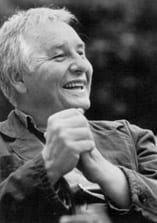 Polish composer Henryk Mikołaj Górecki was included on the 32nd place of the 100 living geniuses list created by Creators Syntetics, a consulting company. The list was compiled through an e-mail research study conducted among four thousand Brits. The list is clearly dominated by Americans with 43%, followed by Brits with 25%. The first place is shared by the inventor of the World-Wide-Web, Sir Tim Berners-Lee and Swiss chemist Albert Hoffman, inventor of LSD. Some of the names on the list are quite controversial. For example such names as Rupert Murdoch, Mohammed Ali, Matt Groning and Osama Bin Laden, who shares the 43rd spot with Bill Gates, are included.
Polish composer Henryk Mikołaj Górecki was included on the 32nd place of the 100 living geniuses list created by Creators Syntetics, a consulting company. The list was compiled through an e-mail research study conducted among four thousand Brits. The list is clearly dominated by Americans with 43%, followed by Brits with 25%. The first place is shared by the inventor of the World-Wide-Web, Sir Tim Berners-Lee and Swiss chemist Albert Hoffman, inventor of LSD. Some of the names on the list are quite controversial. For example such names as Rupert Murdoch, Mohammed Ali, Matt Groning and Osama Bin Laden, who shares the 43rd spot with Bill Gates, are included.
Henryk Mikołaj Górecki became internationally famous when the recording of his 3rd Symphony released by Electra Nonesuch Records sold almost a million copies worldwide within two years of the release.
*New* Oldest Polish Opera
A manuscript of what appears to be the oldest example of Polish opera has been discovered in the library if the University of Poznań. The piece had been listed as a hunting cantata in the catalogue, but was discovered to be an opera by a musicologist from the Academy of Music in Warsaw. All that is known about the work so far is that it is about a hare hunt and that it dates from the early 18th century. More exploration and restoration of the manuscript will follow and undoubtedly reveal many more details. The ensemble Accademia dell’Arcadia is already planning a performance of the piece.
![]() This information for this article is courtesy of the External Service of Polish Radio. If you would like to hear the entire broadcast, please visit: www.polskieradio.pl/zagranica/news/artykul70114.html.
This information for this article is courtesy of the External Service of Polish Radio. If you would like to hear the entire broadcast, please visit: www.polskieradio.pl/zagranica/news/artykul70114.html.
Kwiecień Woos With Recitals
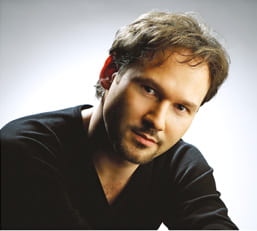 Polish Baritone Mariusz Kwiecień is currently performing the last few concerts of his North American recital tour. Having performed in Kansas City, New York, and Vancouver, he continues on to Forth Worth, Berkeley, and Washington D.C. The program of his recital consists of Schumann’s Dichterliebe, Ravel’s Don Quichotte à Dulcinée, and assorted songs by Tchaikovsky and Karłowicz. Joshua Kosman of the San Francisco Chronicle, in his article from 2 December 2007, quotes Kwiecień’s opinion regarding the challenge of singing recitals versus operas: “‘For a recital, I need to have 100 percent of my heart available,’ he says. ‘It’s just one person for 1 1/2 or two hours, talking only about love.’”
Polish Baritone Mariusz Kwiecień is currently performing the last few concerts of his North American recital tour. Having performed in Kansas City, New York, and Vancouver, he continues on to Forth Worth, Berkeley, and Washington D.C. The program of his recital consists of Schumann’s Dichterliebe, Ravel’s Don Quichotte à Dulcinée, and assorted songs by Tchaikovsky and Karłowicz. Joshua Kosman of the San Francisco Chronicle, in his article from 2 December 2007, quotes Kwiecień’s opinion regarding the challenge of singing recitals versus operas: “‘For a recital, I need to have 100 percent of my heart available,’ he says. ‘It’s just one person for 1 1/2 or two hours, talking only about love.’”
Sunday December 9, 3:00pm
Cal Performances series
UC Berkeley’s Hertz Hall, Berkeley, CA
(510) 642-9988, www.calperfs.berkeley.edu
Thursday, December 6, 7:30pm
“Cliburn at the Kimbell” series
Kimbell Art Museum – 3333 Camp Bowie Blvd, Fort Worth, TX
817-332-8451
Thursday, December 13, 7:30pm
Vocal Arts Society recital series
Embassy of Austria, Washington D.C.
202-365-9064, www.vocalartssociety.org
Malawski Composition Competition
 This new competition was announced by the Artur Malawski Rzeszów Philharmonic in honor of the 50th anniversary of death of its patron. Marek Stefański, the director of the Philharmonic, says there are only two limitations. The composer may be no older than 30 on June 1, 2008 and the composition shall be no longer than 15 minutes. There are no guidelines for the composition itself, and it can be written for ensemble of any size and instrumentation. The compositions will be examined by composer Krystyna Moszumańska-Nazar, conductor Marek Pijarowski, and conductor Andrzej Jakubowski. The deadline for the submission of three copies of the scores is June 1, 2008. The results will be announced during the inauguration of the 2008/2009 concert season of the Rzeszów Philharmonic. The concert will include performance of the winning piece and an awards ceremony.
This new competition was announced by the Artur Malawski Rzeszów Philharmonic in honor of the 50th anniversary of death of its patron. Marek Stefański, the director of the Philharmonic, says there are only two limitations. The composer may be no older than 30 on June 1, 2008 and the composition shall be no longer than 15 minutes. There are no guidelines for the composition itself, and it can be written for ensemble of any size and instrumentation. The compositions will be examined by composer Krystyna Moszumańska-Nazar, conductor Marek Pijarowski, and conductor Andrzej Jakubowski. The deadline for the submission of three copies of the scores is June 1, 2008. The results will be announced during the inauguration of the 2008/2009 concert season of the Rzeszów Philharmonic. The concert will include performance of the winning piece and an awards ceremony.
For more information please visit the official website of the Rzeszów Philharmonic.
Controversial Warlikowski
A staging of Tchaikovsky’s Eugene Onegin directed by Krzysztof Warlikowski (pictured at left) has created quite a buzz in artistic circles in Munich, Germany. The Staatsoper staging, conducted by Kent Nagano, implied that Onegin is in fact homosexual and presented the fact quite graphically on stage. Half of the audience booed, the other half cheered, to the point that Kent Nagano had to stop the orchestra and wait for the ruckus to end.
Warlikowski, in an interview for Takt magazine, explained that he found the inspiration for the adaptation in Tchaikovsky’s biography and in the movie Brokeback Mountain by Ang Lee. Krzysztof Warlikowski is happy with his debut in Germany. He managed to shock the audience, which always guarantees publicity.
Masecki/Trio Taq Tour
The Polish Cultural Institute NY is presenting young Polish jazz pianist Marcin Masecki and his Trio TAQ from December 17-21 in various East Coast cities. See the Institute’s website for tour details. Below is the press release for the tour:
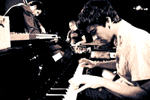 Marcin Masecki, the celebrated young jazz pianist who took the contemporary jazz world by storm when he won the 2005 Moscow International Jazz Piano Competition (its jury chaired by legendary Martial Solal), is being brought back by The Polish Cultural Institute on a U.S. tour with his long-time partners in Trio TAQ – Canadian bassist Garth Stevenson and Israeli drummer Ziv Ravitz.
Marcin Masecki, the celebrated young jazz pianist who took the contemporary jazz world by storm when he won the 2005 Moscow International Jazz Piano Competition (its jury chaired by legendary Martial Solal), is being brought back by The Polish Cultural Institute on a U.S. tour with his long-time partners in Trio TAQ – Canadian bassist Garth Stevenson and Israeli drummer Ziv Ravitz.
Trio TAQ was founded in Boston in 2002 while Masecki, Stevenson and Ravitz were studying at the Berklee College of Music. During a six-hour session of original compositions and improvisations, Marcin, Garth, and Ziv experienced a chemistry and magic like no other, and forged a lifelong bond and band. They began performing in Boston and New York and in March 2003 made their first trip together to Poland. Audiences were immediately captured by the energy, connectivity, telepathy, and honesty of the music. Over the next four years TAQ continued touring in Eastern and Western Europe at major jazz festivals and piano festivals like the London Jazz Festival and the International Jazz Piano Festival in Prague, as well as in clubs and concert halls. In 2005 TAQ recorded their album “TAQ Live in Minsk Mazowiecki.” Collectively they have performed with an impressive roster of notable artists including Joe Lovano, Lee Konitz, Tomasz Stanko, George Garzone, Ben Monder, Dave Samuels, Avishai Cohen and many others.
Krenz Premiere
The world premiere performance of Jan Krenz’s Requiem took place on November 23 in Kraków Philharmonic. The piece, written for baritone solo, choir and large orchestra, was completed in May 2007. Each of the 9 sections depicts a human experiencing the mystery of the divine. For this performance, the composer himself conducted the Kraków Philharmonic and Adam Kruszewski performed the baritone solo. The concert, which also included works by Schumann and Strauss, was repeated on November 24th.
(More news of November’s performances below)
Lutosławski At Carnegie
Below is the Polish Cultural Institute’s press release for the December 7th concert in Weill Recital Hall at Carnegie Hall:
Noted by critics and audiences for their unmatched energy, technical mastery, and connection to their listeners, The Knights Chamber Orchestra will make its Carnegie Hall debut with an eclectic program that features works by Lutoslawski, Bartok, Haydn, Torelli, Bigar and a selection of traditional Gypsy tunes.
Witold Lutoslawski’s early Overture for Strings, long overshadowed by the First Symphony (1947) and Musique Funebre (1958), will open the Knights’ concert. Composed in 1949, the composition is illustrative of the composer’s interest in the music of Bela Bartok, especially Bartok’s Divertimento for Strings (1939), which will be featured in the second part of the program. In the Overture, the similarity to Bartok’s music is apparent in the organization of musical material through a close motivic construction, in which a variety of interrelated three- and four-note melodic cells are continuously manipulated in generating longer melodic lines as well as short motifs.
After his First Symphony, the first prominent composition to be labeled “formalist” and banned in a wave of Stalinist repression, Lutoslawski turned to experimentation in study pieces based on folk elements. For the next several years he composed mostly functional music – children’s songs, easy piano pieces, and small ensemble works. Lutoslawski used those utilitarian works, mostly in private sketches, to experiment in developing his own individual musical language. The Overture was the first abstract piece from that time – written in the composer’s new harmonic language – to reach the stage. Since then his distinctly defined and highly characteristic sound, “perfectly balanced between form and content, intellect and emotion” was steadily evolving to become fully apparent after the Thaw of 1956.
“The Overture for Strings”, writes Andrzej Chlopecki, “is the most interesting composition to be composed before the Musique Funebre… With its widely understood neoclassical features, it links itself on the one hand to the scores of Albert Rousell and on the other to the music of Bela Bartok. In many aspects the Overture foreshadows what was to become of Lutoslawski’s music after the Musique Funebre or even the Venetian Games (1961). It is in this composition that Lutoslawski for the first time used the ‘chain technique,’ a technique based on the overlapping of various elements and their gradual exchange, so characteristic of his latter style.”
The Knights’ program will also include the world premiere of Philippe Bigar’s Printemps Perdu, Joseph Haydn’s joyous Concertino with acclaimed pianist, Steven Beck, Giuseppe Torelli’s rarely performed Christmas Concerto, and selection of traditional gypsy tunes, a signature part of the ensemble’s virtuosic and bravura style.
The Knights’ performances have been captivating audiences for the past seven years. Critics from the New York Sun say the Knights’ performances are “truly an exhilarating experience.” The New York Times said “You had the feeling of being with musicians, not just observing them.”
The Knights Chamber Orchestra is a fellowship of accomplished young musicians, graduates of Juilliard, Curtis, Manhattan, Mannes and Eastman, who come together for the shared joy of musical exploration. The Knights include members of Yo-Yo Ma’s Silk Road Ensemble and musicians who have performed as soloists with the New York Philharmonic, Chicago Symphony Orchestra, Israel Philharmonic, to name a few, and appeared at the world’s most prestigious music festivals, including Marlboro, Tanglewood, Verbier, Stillwater, Lucerne, Salzburg and Moritzburg. The Knights have recently performed at the Chamber Music Society of Lincoln Center, Bargemusic, Musicians for Harmony, and were the resident chamber orchestra for the 2007 Philip Glass MATA Festival.
Awards
VIII Fitelberg Int’l Competition For Conductors
A Special Report From Poland by Gary Fitelberg
The 8th Grzegorz Fitelberg International Competition for Conductors took place during November 16 through 25, 2007, in Katowice, Poland in the heart of the seat of Silesian culture. The prize winners were gold baton winner Eugene Tzigane McDonough of the USA, silver baton winner Lin Chen of China, and bronze baton winner Sean Newhouseof the USA. For the first time the first (gold), second (silver) and third place (bronze) award winners were honored with and received batons rather than medals made by the well-known Poznań jewelry company W. Kruk, established 1840, one of the sponsors of the event. The competition gets bigger and better with each and every edition.
Grzegorz Fitelberg (1879-1953) was among the most distinguished Polish conductors in history, having conducted and/or founded Poland’s leading orchestras, including the Warsaw Philharmonic Orchestra, Polish National Radio Symphony Orchestra, and Silesian Philharmonic.
The initiator and organizer of the Grzegorz Fitelberg International Competition for Conductors was distinguished Polish conductor, Karol Stryja (1915-1998), the last student of Grzegorz Fitelberg, and the director of the National Silesian Philharmonic. The competition was founded on the 100th anniversary of the birthday celebration for its patron, in 1979. Since then it has been held every four years in either three or four stages. It was preceded by two national competitions.
The repertoire (overtures, symphonies, symphonic poems, concertos), consists of the ouevres of Vienna classicism, romanticism and 20th century music, including pieces by Polish composers. Selection from the repertoire, as determined in the competition regulations, takes place by drawing 20 minutes prior to the performance.
The competition features young conductors, those who have not yet reached the age of 35, from almost every continent on the globe. Over 200 applicants sought to go for the gold this year – only 40 were chosen to be competitors. Twelve competitors were selected from the first stage to move on to the second stage. Only six competitors were chosen to the third and final stage. I do not envy the job of the Jurists to have chosen candidates for the final stages of the competition. All were very uniquely talented young conductors in their own right. All were bright, creative, determined, enthusiastic, friendly – the crème de la crème of young conductors of today and tomorrow. The future looks very bright for this chosen career. The participants represented the future Zubin Mehtas and Simon Rattles of the next generation.
Out of the 209 applicants, from 43 countries of all the continents except Africa, 40 candidates were chosen. They came from near and far. Australia. Brazil. Bulgaria. China. Czech Republic. Finland. France. Germany. Great Britain. Hungary. Italy. Japan. Lithuania. Poland. Russia. South Korea. Spain. Switzerland. Ukraine. USA. The youngest was only 20 years of age. The oldest were all born in 1973 and thirty-three years old. At least five from Polish natives, of which three were women and of whom two made it to stage two.
What a wonderful, world class event for classical music and conductors!!! The event may be compared to the Olympics for all the young enthusiastic competitors trying to impress the judges with their very high level of conducting skills, combined with their own individual nuances and personalities. Launching their conducting careers is their dream and goal. In this prestigious conducting competition, both participation and prizes are in their heart, mind and soul.
This competition is a member of The World Federation of the International Music Competitions in Geneva. After the Frederyk Chopin Piano Competition in Warsaw and Henryk Wieniawski Violin Competition in Poznań, it is the third most important music competition in Poland.
The Director of the 8th GFICC was Grażyna Symborska and Artistic Director Mirosław Jacek Blaszczyk. The Master of Ceremonies and Voice of the Competition was Alexander Laskowski. The competition took place under the honorary patronage of Mr. Lech Kaczyński, the President of the Republic of Poland. The honorary committee consisted of an impressive group leading members of government such as Kazimierz Michał Ujadowski, Minister of Culture and National Heritage; Jan Olbrycht and Jerzy Buzek, members of the European Parliament; Krystyna Bochenek, Senator RP, Alojzy Lysko, Ewa Amlik, Kazmierz Matuszny, Maria Nowak, members of the Polish Parliament; Tomasz Pietrzykowski, Voivod of Silesia; Janusz Moszyński, Marshall of the Vivoidship of Silesia; Piotr Uszok, Mayor of Katowice; and several leaders of the clergy. Corporate and Media leaders and representatives complimented this diverse and important committee. These included Krzysztof Czerwiński, President of the Executive Board of Polish Radio, S.A. and Rafał Juszczak, President of PKO BP. Last but definitely not least were two top composers, completing off the list – Henryk Mikołaj Górecki and Wojciech Kilar (more on this man later in this special report and summary). An equally impressive lineup of leaders made up the Honorary Organization Committee whose long list of names is too great to mention here.
There were many accompanying events including competitions, exhibitions, concerts, lectures, films and other presentations and projects. Some of these events were concurrent and some preceded the actual competition. The artistic competitions and exhibitions related to the conductor competition included following:
The All-Poland Poster Competition Promoting the 8th Gzregorz Fitelberg International Competition for Conductors in Katowice – October 2005
The winners of the Poster Competition were Stefan Drobner from Łódź – first place award, Andrzej Maciejewski from Szczecin – the second place award and Karolina Podowska from Gdańsk – the third place award. Exhibitions from this contest were shown in Katowice at the Silesian Philharmonic Orchestra during September 7-23, 2007, in Ruda Sląska at the Municipal Cultural Centre, Gallery “Fryna” during October 7-28, 2007, and in Cieszyn at the Silesian castle of Arts and Entrepreneurship from November 14th through December 8, 2007.
The All-Poland Grzegorz Fitelberg Composing Competition – December 2006
Accompanying the international conductor’s competition, this reinstituted contest is a continuation of the once prominent Katowice competitions, approved and organized by the National Symphonic Orchestra of the Polish Radio (NOSPR), formerly the Polish National Radio Symphony Orchestra (PNRSO).
Twenty Four (24) compositions were sent to the competition, in compliance with the regulations for no longer than 15 minutes – pieces of music for a great symphonic orchestra. They were evaluated by the jury led by Professor Eugeniusz Knapik. The first place award winner was Bartosz Kowalski-Banasewicz from Warsaw for his Symphony No. 2. The second place award went to Tomasz Jakub Opłaka from Ostrowiec Swietokrzyski for Epiderma. The third place award was won by Radosław Luczoweskifrom Gdańsk for Musica per orchestra. Moreover, the jury decided to grant Krystof Urbański with an honorary distinction from Pabianice for Small Festive Symphony.
“Impression-Expression” Competition for a small graphic form – November 2007
This competition was announced and sponsored by the Silesian Philharmonic, the Fine Arts Academy in Katowice, and the Musical Foundation of the Grzegorz Fitelberg International Competition for Conductors. An exhibition was shown in Katowice in the gallery of the Fine Arts Academy “Arts Rondo” from November 13-30, 2007.
There were other exhibitions of ex-libris with musical motives in Katowice at the “Atenuem” Gallery during November 6-30, 2007 and Silesian Library from November 7-24, 2007.
Another exhibition of selected photographs by Juliusz Multarzynski of famous conductors from his book were shown in Katowice at the Upper Silesian Culture Center during November 9-25, 2007 and in the Silesian Philharmonic during the course of the competition. The book consists of photographic portraits of 150 conductors. The book was published in close cooperation between and by the Musical Foundation of the Grzegorz Fitelberg International Competition for Conductors, Silesian Philharmonic, Ministry of Culture and National heritage and Frodo. A former director of the competition Leon Markiewcz, an author and biographer, musicologist and professor wrote the forward and text for the book.
An exhibition of stage designs to the works of Karol Szymanowski, whose music was especially promoted by Grzegorz Fitelberg, was shown at the Polish Sceneography section of the Silesian Museum from October 25 through December 7, 2007. One of the many sponsors, Porcelana Śląska, issued a new musical porcelain pattern entitled “Syzmanowski” in conjunction with the competition.
That’s not all…
A series of concerts took place during June in Koszecin, September in Chełm Śląski, Sosnowiec and Katowice, October in Warsaw, and during November in Cieszyn and Katowice.
A premiere of a new film by Stanisław Janicki, Fullfillment. Story about Grzegorz Fitelberg in Two Parts with an Epilogue, was produced by the Film Art Centre “Silesia Film” and shown at a pre-competition press conference.
There was also a lecture presentation by the famous documentary filmmaker on the “Life of Leonard Bernstein” and discussing his conducting art on the basis of selected recorded concerts at the Film Art Centre “Silesia Film” and a showing of films with the music of the great Russian composers Sergei Prokofiev and Dmitri Shostakovitch.
A special postage stamp was available at the Silesian Philharmonic to commemorate this very special artistic and musical event.
* * *
The opening concert of the competition, in a nice contrast, featured the young first prize winner of the Grzegorz Fitelberg All Poland Composers Competition and the established seasoned veteran of composition Wojciech Kilar. This concert, inaugurating the competition, was performed by the Symphonic Orchestra and Choir of the Silesian Philharmonic under the batons of conductor Mirosław Jacek Blaszczyk and Choir Master Waldemar Sutryk.
Bartosz Kowalski-Banasewicz, winner of the All Poland Composers Competition is one very creative composer. His composition Symphony No. 2 makes use of an innovative concept – a string quartet combined with a symphonic orchestra – bringing together the best of both classical genres: chamber music and symphonic music. He is a very bright composer whose light has still to shine on us for many many many years to come. His music is creative, diverse, and some would say genius. This young man is also very humble in light of his special talent. A remarkable individual and intellect, who is impressive to say the least. The string quartet that performed the piece was the Wilanów Quartet.
Wojciech Kilar had the World Premiere of his 5th Advent Symphony at the opening concert. The World Premiere of his Magnificant I Victoria was recorded in conjunction with the competition by the Silesian Philharmonic Choir under the baton of conductor Mirosław Jacek Blaszczyk with soprano Izabella Kłosińska, tenor Tomasz Krzysica and Choir Master Waldemar Sutryk. This was his 75th birthday celebration and dedicated to him on this occasion.
Also featured in the concert was the premiere of composer Stanisław Moryto’s Music Concertante for a symphonic orchestra and string quartet.
The competitors and conductors enjoyed the consistent support of the fantastic Silesian Philharmonic, who gave their best performances and support for each and every participant, no matter how difficult or inexperienced or nervous they were. A good indication of the stronger candidates, however, was how they interacted with the orchestra, and how the orchestra reacted to them. The orchestra’s choice of prizewinners was held in very high regard by the contestants. The Silesian Philharmonic ranks amongst the top philharmonic orchestras in the world – a small but powerful group who are always in synch with each other, the conductor, and especially the audience. They are a warm group of musicians who live and love the music, delivering it straight from their hearts mind and soul. The young conductors and competitors were fortunate to have them.
The Jury consisted of Chairman Tadeusz Strugała (Poland), Mirosław Jacek Błaszczyk (Poland), Juozas Domarkas (Lithuania), Patrick Fournillier (France), Piotr Gajewski (USA), originally from Poland), Marek Pijarowski (Poland), Jerzy Salwarowski (Poland), Jin Wang (China), Andreas Weiss (Germany), Victoria Zhadko (Ukraine), and Secretary Bernard Polok (Poland), who is also the president of the Music Foundation of the Grzegorz Fitelberg International Competition for Conductors. Some of the judges had first-hand personal knowledge of the pressure and stress of the participants, having been participants in the competition themselves. These included Błaszczyk, Fournillier, Wang and Zhadko. Their work consisted of long days and sleepless nights, with little time before each stage of the competition and announcement of the winner, and a very tight schedule allowing little margin for decisions.
 One hopes that the Jury will become even much more prestigious with the addition of such great Polish conductors such as Antoni Wit of the Warsaw Philharmonic, Jan Krenz, Laureate Conductor of the NOSPR and Stanisław Skrowaczewski, 1st Guest Conductor of the NOSPR, all of whom are historically connected and relevant with the named patron of the event. Perhaps other prestigious Polish conductors such as Kazimierz Kord and others may be added to the list of honorary jurists as well.
One hopes that the Jury will become even much more prestigious with the addition of such great Polish conductors such as Antoni Wit of the Warsaw Philharmonic, Jan Krenz, Laureate Conductor of the NOSPR and Stanisław Skrowaczewski, 1st Guest Conductor of the NOSPR, all of whom are historically connected and relevant with the named patron of the event. Perhaps other prestigious Polish conductors such as Kazimierz Kord and others may be added to the list of honorary jurists as well.
The clear choice for the gold from the beginning was Eugene Tzigane McDonough, who has a very bright career and future ahead of him. He was born to conduct. Class. Confidence. Diplomacy. Expressiveness. Humility. Intellect. Knowledgeable. Style. These are only but a few of the qualities of this great conductor for the future. The audience loves him. The judges love him. The orchestra loves him. His standing ovation lasted at least 15-20 minutes each time.
One special thing to note about the competition was the young students who attended the competition events daily and religiously with such enthusiasm and focus that their spirit will remain with me all my very days. These were students of the Szymanowski Music Academy, one of the oldest in Poland, and will be the future music lovers and members of the leading Polish orchestras of the future. Many, if not most of the Silesian Philharmonic are also closely connected as graduates of this excellent institution. It was a real honor and pleasure to have been the special “Guest of Honor” on a tour of this exceptional music academy of the world.
The competition attracted much international and local media from the print media, radio and television. The magnitude of the organization and planning as well as marketing and publicity that went into such a world-class event can not be overestimated. As the competition expands and grows so will be the need for additional sponsors and supporters.
The competition concluded with a concert of the top three candidates and prize winners attended by a standing room only crowd followed by a special reception throughout the very beautiful and elegant small hall of the Silesian Philharmonic.
Paderewski Piano Competition Results
The 7th edition of the Ignacy Jan Paderewski International Piano Competition has ended in Bydgoszcz. The first prize was given to Nikita Mndojanc from Russia. Second prize went to Julianna Awdiejewa (Russia) and third prize was given to Marianna Prjevalskaya(Spain). Lilit Gregorian (Armenia) has won the fourth prize and the fifth prize was given to Melody Quah (Malaysia) and Pawieł Rajkierus (Russia) ex-aequo.
The competition took place in the Pomeranian Philharmonic concert hall and the soloists were accompanied by the Pomeranian Philharmonic Orchestra, conducted by Tadeusz Wojciechowski. There were 44 participants including eight Polish pianists; unfortunately Łukasz Trepczyński and Piotr Banasik made it to the semi-finals but not the final round.
This year the Jury included: Piotr Paleczny – chairman (Poland), Zhaoyi Dan (China), Bernd Goetzke (Germany), Andrzej Jasiński (Poland), Daejin Kim (Korea), Alexei Orlovetski (Russia),
Katarzyna Popowa-Zydroń (Poland), Jerome Rose (USA), Jacques Rouvier (France), Lee Kum Sing (Canada), Regina Smendzianka – honorary chairman (Poland), Jerzy Sulikowski (Poland), Yuko Yamaoka (Japan) and Mariusz Klimsiak (Poland) – secretary.
Int’l Violin Competition In Toruń
 In the 1st edition of the International Violin Competition in Toruń, the first prize went to Erin Keefe from the United States. The second prize went to Artiom Shishkov from Belarus and the third to Malwin Sosnowskifrom Switzerland. Three honorary mentions went to Marta Pawłowska, Maciej Strzelecki and Aleksandra Tomasińska.
In the 1st edition of the International Violin Competition in Toruń, the first prize went to Erin Keefe from the United States. The second prize went to Artiom Shishkov from Belarus and the third to Malwin Sosnowskifrom Switzerland. Three honorary mentions went to Marta Pawłowska, Maciej Strzelecki and Aleksandra Tomasińska.
For the first round, performers were required to prepare a 50 minute recital, including a sonata for violin and piano and a virtuosic solo piece. The second round required a performance of a Bach sonata or partita, a piece by either Lutosławski or Penderecki, and a violin sonata by Ysaÿe. In the final round, participants had a choice of 5 violin concertos: Brahms, Tchaikovsky, Sibelius, Shostakovich or Szymanowski. This was the first edition of the competition and organizers plan to hold it every three years. This year there were 26 young violinists from 13 countries.
Discography
Christmas Music & Slavic Arts Ensemble
By Gary Fitelberg
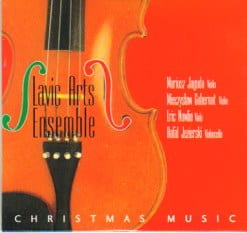 While gathered around the Christmas tree, surrounded by snow, enjoying a hot cup of coffee, tea or chocolate, one can delight with the relaxing sounds of Christmas carols presented by the Slavic Arts Ensemble. Their CD offers Christmas music arranged by Polish composer/conductor/violinist Walter Legawiec. This recording features Slavic Arts Ensemble members Mariusz Jagoda (Violin), Mieczyslaw Gubernat (Violin), Eric Nowlin (Viola), and Rafal Jezierski (cello).
While gathered around the Christmas tree, surrounded by snow, enjoying a hot cup of coffee, tea or chocolate, one can delight with the relaxing sounds of Christmas carols presented by the Slavic Arts Ensemble. Their CD offers Christmas music arranged by Polish composer/conductor/violinist Walter Legawiec. This recording features Slavic Arts Ensemble members Mariusz Jagoda (Violin), Mieczyslaw Gubernat (Violin), Eric Nowlin (Viola), and Rafal Jezierski (cello).
The Christmas Carols from Europe include: 1. Christmas Dreams (Catalan); 2. Songs of the Birds (Catalan); 3. Song of the Bagpipers (Neopolitan); 4. In Bethlehem (English); 5. Oh, Star of Bethlehem (Polish); 6. The Message of Christmas Morn (Provencal); Christmas with Great Joy (Danish); The Children at the Manger (Provencal); 9. Companions, All Sing (Basque); 10. Kujawiak-Mazurka by Henryk Wieniawski, 11. Music for Christamas Recollections by Walter Legawiec; 12. Slavic Christmas Suite by Walter Legawiec; Polish Carols arranged by Walter Legawiec.; 13. When Mary rocked Her Holy Babe; 14. When Christ Was born; 15. Lullaby, Sweet Jesus.
The Slavic Arts Ensemble was founded in 1977 by Mieczyslaw Gubernat with the intent of presenting Polish and Slavic compositions and providing an important forum for performances by outstanding young musicians. The great success of the “Birthday Concert Series” at the Kosciuszko Foundation in New York City, which featured the music of Polish composers, encouraged the Slavic Arts Ensemble to expand its repertoire to encompass all musical eras and styles, including music written expressly for the Slavic Arts Ensemble. Comprised of distinguished musicians, the Slavic Arts Ensemble brings to its performances an enormous range of collective experience and talent in the classic European style of elegance and refinement. Some of the artists who have performed with the Slavic Arts ensemble include: Theresa Kubiak, Christina Petrowska, Hanna Lachert, Jan Jozef Wnek, Krystof Witek, Pawel Knapik, Krystof Kuznik, Maurycy Banaszek, Mateuz Wolski, and others.
Mieczyslaw Gubernat, who plays second violin, is also the Ensemble’s manager and founder. A member of the American Symphony Orchestra under Leopold Stokowski, Gubernat has a long history as a professional musician. He has performed with the Martha Graham Dance Company, the Mantovani Orchestra, American Ballet Theatre and the Radio City Music Hall Orchestra. The young members of the Slavic Arts Ensemble have won many prestigious international competitions—both individually and as an ensemble—and are graduates of European and American music schools, including Juilliard School of Music. They perform regularly on the world’s most prestigious concert halls, such as Carnegie Hall and Lincoln Center.
The Slavic Arts Ensemble will soon celebrate its third decade of performance, staying true to its original purpose of promoting Polish and Slavic music, as well as the talents of exceptional young musicians. The Slavic Arts Ensemble has also released another CD masterpiece, “Chopin For Strings.”
Slavic Arts Ensemble’s Christmas Music CD was recorded by Leszek Maria Wojcik at St. Stanislaw Kostka Church in Greenpoint, Brooklyn, NY. For a copy, please send your order to the Slavic Arts Ensemble c/o 139 Noble Street, Dept. “A” Brooklyn, NY, 11222 or contact slavicartsensemble@earthlink.net.
Melcer, Plowright & Herter
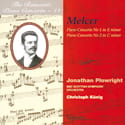 Melcer: Piano Concertos
Melcer: Piano Concertos
Henryk Melcer-Szczawinski (1869-1928): Piano Concertos Nos 1 and 2
Jonathan Plowright, piano; BBC Scottish Symphony Orchestra,
Christoph König, cond.
Hyperion CDA67630
This CD, to be released in January 2008, features both of our 2006 Paderewski Lecture-Recital guests: Jonathan Plowright on piano, and Joseph Herter in the liner notes. Gramophone reviewer Jeremy Nicholas approves of both. In his review from the November 2007 issue, he not only compliments “Joseph A Herter’s valuable booklet,” but goes on to say this about Jonathan Plowright’s performance:
As with his compelling performances of the two Stojowski concertos (6/02 – not to mention his subsequent Hyperion discs of Paderewski and Bach-Rummel), Plowright enhances his glowing reputation as a musical alchemist of rare distinction with a transcendent technique.
The Hyperion website gives the following information about this disc and Melcer’s compositions:
Hyperion’s celebrated Romantic Piano Concerto series reaches volume 44. This disc includes two prize-winning concertos written in the 1890s by the Polish composer-pianist Henryk Melcer.
The first is written in the style of Liszt and Chopin, and is notable particularly for its thrilling finale which is marked by its strong Polish character: starting as a mazurka, the accelerando through the movement increases the excitement of the piece, giving it the frenzy of a kujawiak or oberek.
The second concerto was also appreciated by contemporary critics for its imaginative use of Polish themes: one reviewer writes of ‘themes full of expression in Polish character that are developed so splendidly and broadly that they leave us enraptured … an unforgettable impression remains after hearing the Concerto’. This work demands particular technical virtuosity, versatility and stamina on the part of the pianist, who is playing almost continuously.
Performances
Portraits Of Composers
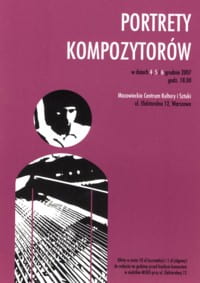 On November 4 – 6, the Mazovian Culture and Art Center presented a series of concerts dedicated to Polish composers. This year’s featured composers included Mariusz Dubaj, Weronika Ratusińska, Wojciech Ziemowit Zych, Zbigniew Kozub, Maciej Zieliński and Bettina Skrzypczak. The concerts were co-funded by the Ministry of Culture and National Heritage and ZAiKS. All performances were recorded for Polish Radio to be re-broadcast at a later time.
On November 4 – 6, the Mazovian Culture and Art Center presented a series of concerts dedicated to Polish composers. This year’s featured composers included Mariusz Dubaj, Weronika Ratusińska, Wojciech Ziemowit Zych, Zbigniew Kozub, Maciej Zieliński and Bettina Skrzypczak. The concerts were co-funded by the Ministry of Culture and National Heritage and ZAiKS. All performances were recorded for Polish Radio to be re-broadcast at a later time.
For detailed program of the concerts please visit the Polish Composer’s Union [ZKP] website.
Komeda Project
The jazz quintet The Komeda Project recently performed at the Cornelia Street Café in New York City. Here’s some of what Budd Kopman of AllAboutJazz.com (November 2007) had this to say about the performance:
 The Komeda Project at Cornelia Street Cafe was electrifying, bringing the music of Krzysztof Komeda vividly to life. Though based on the original arrangements (those on paper and transcribed), the music as played by the present group revitalized it: “THE CORE, THE EXCITING, THE VERY ALIVE ESSENCE OF KOMEDA HIMSELF JUMPED FROM THE STAGE.” What came out … was not a high-quality reproduction of some mystical music from the past, but living, breathing, completely alive music that did not sound dated in the slightest. The reason is that Komeda’s compositions are Art and, as such, are timeless. As good as “Crazy Girl” is, hearing this music live was a fantastic experience…
The Komeda Project at Cornelia Street Cafe was electrifying, bringing the music of Krzysztof Komeda vividly to life. Though based on the original arrangements (those on paper and transcribed), the music as played by the present group revitalized it: “THE CORE, THE EXCITING, THE VERY ALIVE ESSENCE OF KOMEDA HIMSELF JUMPED FROM THE STAGE.” What came out … was not a high-quality reproduction of some mystical music from the past, but living, breathing, completely alive music that did not sound dated in the slightest. The reason is that Komeda’s compositions are Art and, as such, are timeless. As good as “Crazy Girl” is, hearing this music live was a fantastic experience…
The Komeda Project consists of founding members saxophonist Krzysztof Medyna and pianist Andrzej Winnicki, plus trumpeter Russ Johnson, bassist Michael Bates, and drummer Dave Anthony. According to their website, “[the group] was brought to life from a desire to perform – on this side of the Atlantic – and be able to hear live music of Krzysztof Komeda again.” The “open” style of Komeda’s compositions, which often involve a great deal of jazz improvisation, lend themselves well to performance and re-invention by other ensembles. This is what the Komeda Project strives to share with their audiences.
This year’s final performance by the Komeda Project will take place on:
Sunday, December 16, 2007
7:00-10:30 PM
Van Gogh’s Ear
1017 Stuyvesant Ave
Union, NJ 07083
Tel. (908) 810-1844
Choral Music Of Protest
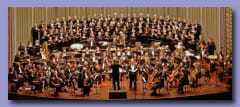 In an article entitled “War protest through choral music,” Philadelphia Inquirer writer Dan Webster reviewed a concert called “On the Transmigration of Souls,” which aptly began with Szymanowski’s Stabat Mater (1926). The concert was conducted by Alan Harler, who led the combined forces of the Mendelssohn Club chorus (the concert’s organizing body), the Chamber Orchestra of Philadelphia, Bel Canto, and the Motet youth choruses. Joining the chorus and orchestra for the Stabat Mater were soloists Karen Slack, soprano; Ezgi Kutlu, mezzo-soprano; and David Krohn, baritone. Webster says this about the Szymanowski:
In an article entitled “War protest through choral music,” Philadelphia Inquirer writer Dan Webster reviewed a concert called “On the Transmigration of Souls,” which aptly began with Szymanowski’s Stabat Mater (1926). The concert was conducted by Alan Harler, who led the combined forces of the Mendelssohn Club chorus (the concert’s organizing body), the Chamber Orchestra of Philadelphia, Bel Canto, and the Motet youth choruses. Joining the chorus and orchestra for the Stabat Mater were soloists Karen Slack, soprano; Ezgi Kutlu, mezzo-soprano; and David Krohn, baritone. Webster says this about the Szymanowski:
Szymanowski’s work mourned many things, personal and philosophical. His original text was in Polish, but the Mendelssohn Club sang English. The challenge of so much dense harmony seemed to vanish in this stylish choral reading. The orchestra, too, seemed to relish the unusual voice leading and harmonies.
The rest of the evening’s program consisted of the Philadelphia premiere of John Adams’ On the Transmigration of Souls and the second performance of James Primosch’s Fire-Memory, River-Memory, a Mendelssohn Club commission from 1998. The concert was held at Girard College Chapel on November 3rd.
To read the rest of Dan Webster’s November 5th review, please visit: www.philly.com.
 Another choral concert that drew on music’s power of protestation this month was a performance by the David York Ensemble in Portland, OR on Saturday, November 17th. Henryk Górecki’s Miserere, the central musical work of this concert, set the tone of quiet, sustained power. Reviewer David Stabler of the Oregonian wrote this of the experience: “No matter what your belief, the Polish composer Gorecki — like J.S. Bach — is a composer of spiritual persuasiveness. The prolonged pleas of ‘Miserere,’ written in response to a violent 1981 protest in Poland, came to feel like holy stillness.” Also performed on the program were a medieval chant by Hildegard von Bingen, a piece by Joan Andrews, and York’s own oratorio, Mother of Us All.
Another choral concert that drew on music’s power of protestation this month was a performance by the David York Ensemble in Portland, OR on Saturday, November 17th. Henryk Górecki’s Miserere, the central musical work of this concert, set the tone of quiet, sustained power. Reviewer David Stabler of the Oregonian wrote this of the experience: “No matter what your belief, the Polish composer Gorecki — like J.S. Bach — is a composer of spiritual persuasiveness. The prolonged pleas of ‘Miserere,’ written in response to a violent 1981 protest in Poland, came to feel like holy stillness.” Also performed on the program were a medieval chant by Hildegard von Bingen, a piece by Joan Andrews, and York’s own oratorio, Mother of Us All.
Read David Stabler’s entire review here: www.oregonlive.com.
Anniversaries
Born This Month
- 3 December 1896 – Boleslaw SZABELSKI, composer (d. 1979)
- 5 December 1899 – Boleslaw WOYTOWICZ, composer (d. 1980)
- 6 December 1933 – Henryk Mikolaj GÓRECKI, composer
- 11 December 1876 – Mieczyslaw KARLOWICZ, composer (d. 1909, under an avalanche in Tatra mountains)
- 14 December 1789 – Maria SZYMANOWSKA, composer, virtuosa pianist (d. 1831, of cholera). Read her biography: PMHS Vol. 9
- 18 December 1907 – Roman PALESTER, composer, broadcaster (d. 1989)
- 23 December 1830 – Adam MINCHEJMER, composer and conductor (d. 1904)
- 24 December 1859 – Roman STATKOWSKI, composer, teacher (d. 1925)
- 29 December 1902 – Henryk VARS , film and popular music composer (d. 1978)
Died This Month
- 3 December 2004 – Marek STACHOWSKI, professor, composer, and administrator at the Music Academy in Kraków (b. 1936)
- 11 December 1945 – Seweryn EISENBERGER, pianist (b. 1899)
- 20 December 1834 – Maurycy MOCHNACKI, music critic, writer, pianist (b. 1804)
- 21 December 1938 – Arnold LUDWIK, violin maker (b. 1873)
- 21 December 2005 – Ryszard SIELICKI, pianist and composer (b. 1916)
- 23 December 1885 – Artur BARTELS, pop singer (b. 1818)
- 23 December 1869 – Julian FONTANA, close friend and musical associate of Chopin (b. July 1810)
- 24 December 1898 – Eugeniusz PANKIEWICZ, pianist and composer (b. 1857)
- 26 December 1945 – Stefan STOINSKI, music ethnographer, writer, conductor (b. 1891)
- 29 December 1913 – Jadwiga SARNECKA, pianist, composer, poet (b. 1877)
- 31 December 1944 – Marian Teofil RUDNICKI, conductor, composer (b. 1888)

